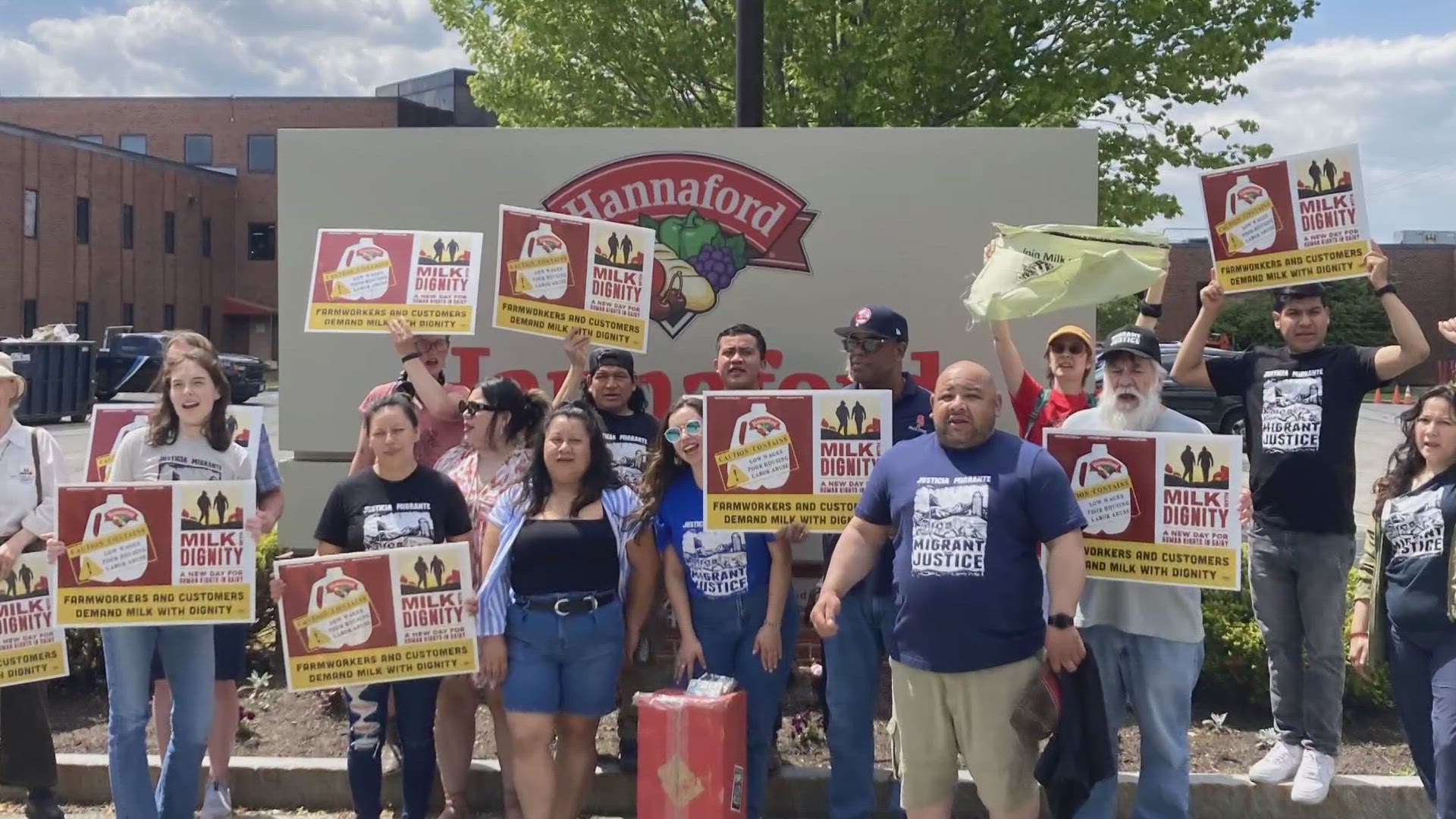SCARBOROUGH, Maine — Hannaford Supermarkets does not own farms or employ farm workers, but workers like Cristian Santos believe the corporation plays a huge role in how they are treated as employees.
"I feel really angry, but I also feel afraid," Santos said.
Santos is an immigrant dairy farmer in Vermont and every day he sources products that are sold daily in Hannaford stores. He's one of many who are angry at the company's refusal to join a program they say would change their lives.
Santos and several farm workers drove four hours to the Hannaford headquarters in Scarborough on Friday. The workers had previously paired up with the Vermont-based nonprofit Migrant Justice to petition Hannaford to adopt its "Milk With Dignity" program. The program is a contracted agreement that would improve both labor and housing conditions for farm workers. It would set a list of worker-defined standards and contractually require Hannaford to only source products from farms that met those standards.
Santos said they tried to make an appointment to speak with Mike Vail, the president of Hannaford Supermarkets, but couldn't get in contact with him.
"We didn't hear anything back so we said, 'OK, we have to show up,'" Santos said.
He and the farm workers arrived at the Scarborough headquarters with signs, chanting outside in hopes of being let in to speak with a representative for the company. The workers say nobody made contact with them, but the police were called.
"We don't get paid sick days, we don't get vacation days at all, we're paid incredibly low, not even close to minimum wage. We're afraid of getting sick because if we get sick then we can't work that day," Santos said, speaking of the current working conditions that could ultimately change if Hannaford were to adopt "Milk with Dignity."
When asked why the program was denied, Hannaford said it is committed to improving conditions for farm workers, but is working on doing so independently from "Milk with Dignity," calling the program "limited in scope and impact."
"We are continuing our critical work towards this goal with industry partners," Ericka Dodge, director of external communications and community relations for Hannaford, said.
One of the ways Hannaford says it is ensuring worker safety is through a 24/7 ethics hotline that allows farm workers to call and make claims that will then be investigated by Hannaford.
"How can they create this helpline for us when they don't even want to come speak to us?" Santos questioned.
The helpline was one of the topics Santos had hoped to discuss at the Hannaford headquarters. Hannaford says to date, every complaint has included a farm visit by a Hannaford associate to investigate. Santos said he's witnessed these visits and found them unhelpful.
"They don't speak with farm workers, they only speak with the farm owners, and obviously the farm owners are going to say, 'No, everything's fine, everything's good on my farm,'" Santos said.
Another way Hannaford said it monitors its farms is directly through suppliers, by completing assessments. The company said with its private milk supplier, it's completed assessments on 200 farms across Hannaford's marketplace, adding it also conducts third-party assessments, which include engagement with farm workers.
"Their excuse is they have their own internal programs keeping people safe and we see that they're clearly not. It's a lie," Rachel Elliott said, an employee of Migrant Justice.
Elliott refers to Hannaford's current policies as "self-policing." She said despite the standards Hannaford says they have, conditions have not improved for workers.
She believes the reason for Hannaford's refusal is money-related. The "Milk with Dignity" program does not come at the cost of the farm or farm workers, but instead to the corporations sourcing from them. It would require Hannaford to pay a bonus/premium to the farms it sources from. The bonus would then be used by farmers to bring their farms up to a new set of worker-defined standards. There would also be a third party involved to audit the farms and make sure they are following the regulations.
"It doesn't cost anyone their job because money is taken from the billions of dollars of profits that Hannaford is making and putting it into the pockets of farmers who can use that to improve conditions on the farms," Elliott said.
Elliott said other corporations who have adopted the program have seen proven results. Ben & Jerry's covers over 250 dairy workers through the program's protections.
"Ben & Jerry's has shown this program can change the lives of farm workers," Elliott said.
Workers like Santos reflect on these success stories, happy for those involved, but also frustrated they are not allotted the same fate.
"I'm here angry, scared, and really sad that I have to return to the reality I am living on one of the farms in Hannaford's supply chain," Santos said.

